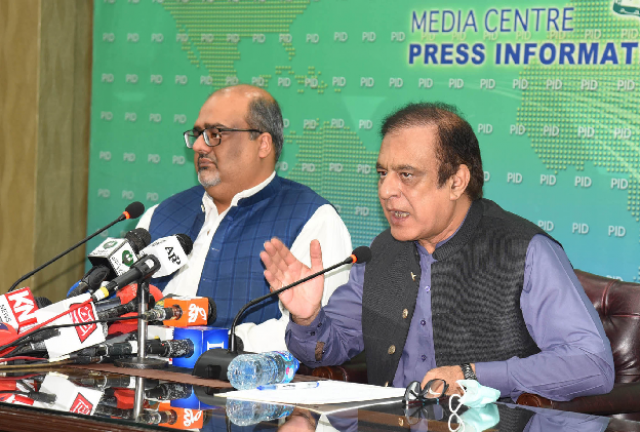FATF bills ‘expose’ true face of opposition
Ministers say legislation done in country’s best interest

Minister for Information and Broadcasting Senator Shibli Faraz on Saturday said the joint sitting of parliament passed the anti-terrorism and anti-money laundering bills to meet the requirements of the Financial Action Task Force (FATF).
“The legislation is done in the best interest of the country and to take Pakistan out of the grey list,” said the minister while addressing a news conference.
He was flanked by Adviser to Prime Minister on Interior and Accountability Shehzad Akbar.
The minister added the previous rulers did not pass legislation on money laundering to serve their own interests and FATF put Pakistan on the grey list.
The opposition was exposed because of the way it opposed the FATF-related legislation, he noted.
The information minister accused the opposition of trying to create hurdles for Pakistan in its efforts for coming out of the FATF grey list. “Every positive development in the country is the bad news for opposition … they want economy and country to collapse,” he maintained.
Faraz described the FATF related bills, recently passed by the joint sitting of parliament, as very important legislation to steer the country out of the FATF grey list. “The opposition parties want to stoke anarchy and confusion and create law and order situation to achieve their vested interests,” he said.
“In light of the FATF's recommendation, we had to enact legislation to curb money laundering and terrorist financing. The reason for making this condition was that our rulers in the past were involved in money laundering and they did not enact any legislation to stop it,” the minister said.
Adviser to the Prime Minister on Interior and Accountability Shehzad Akbar said FATF was represented by countries which review each other’s laws to see whether those meet the requirements to counter money laundering and terror financing.
He said Pakistan had an FATF secretariat represented by different institutions and worked on ways to stop money laundering.
As a responsible government, it was its duty to pass the FATF related legislation, he added.
Shehzad said the government held discussions with the opposition for the last one year on the FATF-related laws. The opposition wanted 34 amendments to the NAB law, he said, adding the government passed the laws with the support of the people despite resistance of the opposition.
Shehzad said due to loopholes in the money laundering law, there were issues of fake accounts. FATF had a booklet mentioning steps to stop money laundering and the government also made provisions in the law to this effect, he added.
“The PTI wants Pakistan to be out of the grey list and stop money laundering,” he asserted.
He said the opposition had tried to stop money laundering cases of Shehbaz Sharif, Asif Zardari, Shahid Khaqan Abbasi and others by proposing amendments to the law.
Opposition wanted that NAB should not be an investigation agency for the offences of money laundering, he told.
He denied that there was a new provision in the laws to put a person in jail for six months. He said institutions could arrest an individual for different crimes and money laundering was made a cognisable offence to avoid delay in investigation.
He clarified that in the age of media and in the presence of journalists and cameras, it was not possible to count wrongly in parliament for passage of bills.
Akbar said the application of investigation techniques was introduced in line with the demand of FATF.
“The opposition wants to end NAB's authority over money laundering investigation,” he said, adding that the propaganda regarding the counting of members in joint session was an attempt to hide their defeat.
With additional input from APP


















COMMENTS
Comments are moderated and generally will be posted if they are on-topic and not abusive.
For more information, please see our Comments FAQ